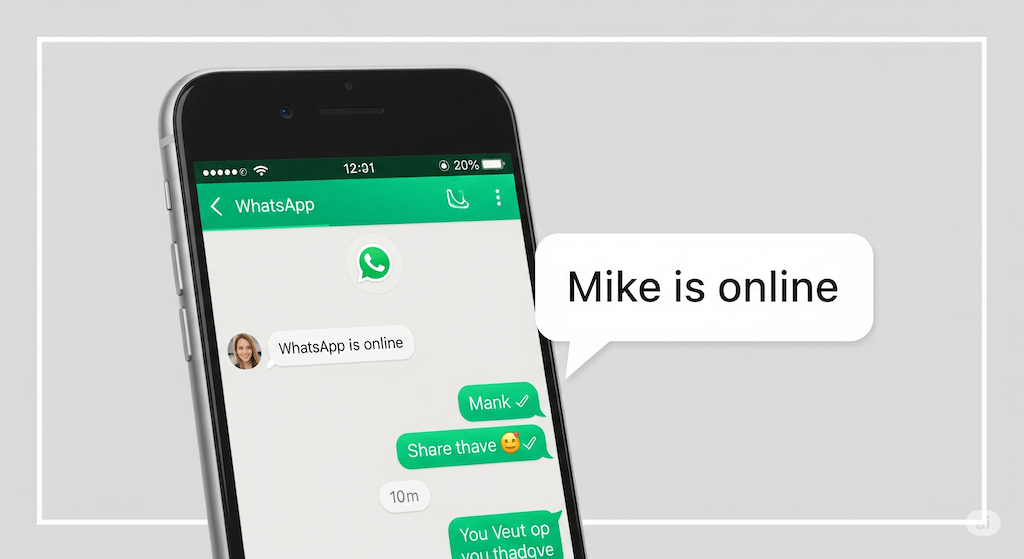In 2025, WhatsApp remains one of the most widely used messaging platforms in the world — boasting over 2.8 billion monthly active users. It’s become the default app for staying connected with friends, family, and even coworkers. But what if you want to know the moment someone comes online on WhatsApp?
Whether you’re trying to catch someone for an urgent conversation, ensure your child is online at a set time, or just keeping tabs on a contact’s availability, getting a notification when they come online can be incredibly helpful. However, WhatsApp doesn’t offer a native “online notification” feature, so you’ll need to use other strategies and tools — responsibly and ethically.
In this guide, we’ll walk you through how to get notified when someone comes online on WhatsApp, and discuss the privacy concerns and limitations to be aware of in 2025.
Why You Might Want Online Notifications
Here are some common, legitimate reasons people look for this feature:
- Time-sensitive communication: Waiting for a client, classmate, or team member to come online
- Parental monitoring: Ensuring that kids are using WhatsApp at agreed-upon hours
- Accountability: For work or remote group tasks, tracking online activity can help with coordination
- Digital safety: For parents or guardians trying to protect minors from late-night chatting
That said, this should always be done ethically — spying on others without consent is both a privacy violation and potentially a breach of local laws.
Method 1: Use WhatsApp Web Manually (Low-Tech Approach)
One of the simplest (but manual) ways is to open WhatsApp Web, select the chat with the person in question, and monitor their status at the top (e.g., “online” or “last seen at…”). While this won’t notify you when they come online, it allows you to check in periodically.
Limitations:
- No real-time alert or automation
- Inefficient for long-term tracking
- Doesn’t work if their “Last Seen” is hidden
Method 2: Use a WhatsApp Online Tracker Tool
Several third-party apps and web-based tools claim to monitor when a contact comes online. These tools typically work by connecting your WhatsApp to their system, and then keeping the status of chosen contacts under surveillance. Popular examples include:
- WaStat
- WhatzTrack
- OnlineNotify (for jailbroken iPhones — not recommended)
- WTrack
How they work:
You input the phone number or select the contact, and the app will send you a notification whenever the person appears online, and when they go offline again.
Pros:
- Real-time online/offline alerts
- Some tools provide daily or weekly usage reports
- Can be used discreetly (though ethically questionable)
Cons:
- May require access to your WhatsApp account
- Risk of data misuse or violating WhatsApp terms
- Paid features and ads in free versions
- May not work if the person hides their “Last Seen” and “Online” status
Important Note: WhatsApp’s newer privacy controls (as of iOS 18 and Android 14) allow users to hide their “Online” status even more effectively. If the person has chosen to restrict who can see when they’re online, no third-party app can reliably bypass that.
Method 3: Use Family Orbit for Ethical Parental Monitoring
If your goal is to monitor your child’s WhatsApp usage — not just online status but overall digital behavior — a parental control app such as Family Orbit provides a far more comprehensive and ethical solution.
Key features:
- Monitors WhatsApp activity through iCloud (for iPhone)
- Logs messages, call history, and usage patterns
- No app installation required on the child’s device
- Sends alerts when certain apps (including WhatsApp) are used
Rather than just focusing on when someone is online, Family Orbit takes a well-rounded, privacy-respecting approach to child safety. It avoids the privacy gray area of spying on others and is designed specifically for monitoring minors with parental consent.
Privacy and Ethical Considerations
With growing digital privacy concerns worldwide, it’s important to understand the boundaries when tracking someone’s online activity:
- Don’t use online trackers on adults without their consent
- Respect WhatsApp’s privacy features — misusing these tools can violate their terms of service
- Talk openly with your child or teen about why you’re using parental controls — it fosters trust, not secrecy
Also, note that WhatsApp continues to tighten privacy controls, so most tracking tools may not remain reliable in the long run.
Final Thoughts
Getting notified when someone comes online on WhatsApp might sound like a simple feature — but it lives at the intersection of convenience and privacy. While there are third-party tools that offer real-time notifications, they come with ethical and technical caveats.
If you’re a parent, using a tool like Family Orbit to track WhatsApp usage holistically — with transparency and accountability — is a smarter and safer choice. For everyone else, manual checks or honest communication remain the best path.






